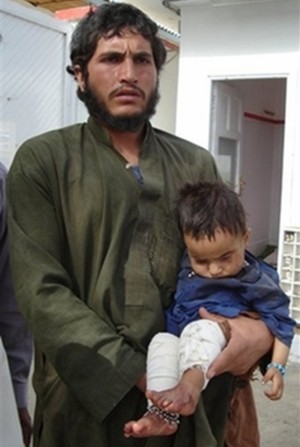Linchpin (Issue One), December 13, 2007
Afghanistan: Climates of Fear
"Some Afghan people say, today Taliban are in power in Afghanistan but those Taliban who have pant and tie but the same mentality!"
Afghanistan has been a primary focus of the so called War on Terror since the events of September 11th and as a result, the already fractured society has been pushed even deeper into chaos, destruction and violence.
Canada has played a minor role in the occupation since the beginning but under Harper’s Conservatives Canada’s participation has intensified. The war shows no sign of slowing down and neither does Harper. Paranoid fear being used to justify a clamp down on our rights, civilian casualties numbering in the 1000’s, and more and more Canadians coming home dead, it seems that any likelihood of a positive outcome has long gone.
Creating stability in the region has been a rallying call for those behind the war, but the notion of a violent occupation being a vehicle for peace and prosperity has yielded the results one might expect from such a backwards concept. The toll of the war on both the infrastructure and population of Afghanistan is staggering.

A small boy injured by US/NATO bombs during the night of August 25/26, 2007 in Musa Qala (by Abdul Khaleq/ AP)
Photo Gallery of US victims in Afghanistan ( http://www.rawa.org/s-photos.htm )
The Afghan Victim Memorial Project by Prof. Marc ( http://pubpages.unh.edu/~mwherold/memorial.htm )
All though there is no way to know the exact numbers, it is estimated that civilian casualties in Afghanistan are in the neighborhood of 5000 deaths. Aside from those who have lost their lives there are countless more wounded and suffering both from coalition attacks and the ensuing violence of having access to food, medicine and other services cut off due to the destruction.
The so called stability that is being granted to the Afghans by their foreign liberators is a complete misuse of the word. Not only has Opium production (which had been virtually eradicated in 2000) made a comeback, currently making up 52% of the countries GDP, but many fundamentalist warlords and profiteers of the drug trade have taken high ranking positions among the NATO backed government and police forces.
The Revolutionary Association of the Women of Afghanistan summed it up well last July in a statement: "the US doesn't know that a reactionary force can be defeated by a different force which first of all should believe in democracy. […] because of these fundamentalist-fostering policies of the US government, things have not been changed to positive in our land. We are living under the shadow of drug-mafia and worse enemies of democracy and women's rights […]
"Some Afghan people say, today Taliban are in power in Afghanistan but those Taliban who have pant and tie but the same mentality!"
The threat that this war poses is not limited to those forced to deal with it first hand, either. A study by 16 intelligence agencies reported that the world is now more susceptible to terrorism as a result of the occupations. However the definition of such terrorism should not be limited to suicide bombers and the like, terror and repression at the hands of the Canadian state, both at home and abroad, is also increasing alongside the war.
Along with the newly revamped military, Canada has also turned up the climate of fear and hate which is currently consuming the US. Harper and Bush continue to collaborate with one another to strip down the rights of anyone they feel is a threat. There are currently 6 examples of such people being either held in prisons or house arrest in Canada without charge. This is legitimized through the use of security certificates, which target non-citizens and allow the government to imprison them indefinitely with no trial and without showing the accused any of the evidence, effectively eliminating any chance to defend themselves.
Those who are posed with the same allegations in Afghanistan have an even worse situation to face. Earlier this year Defence Minister Gordon O'Connor stated that the Red Cross oversaw the transfer of prisoners from Canadian to Afghan authorities, which was later directly contradicted when the Red Cross denied any involvement in the process.
Allegations that prisons in Afghanistan are rife with torture and abuse is unfortunately nothing new, and little is being done about it. This treatment in itself should raise some eyebrows concerning our role as the "civilized peace makers".
Characters Count: 4942
